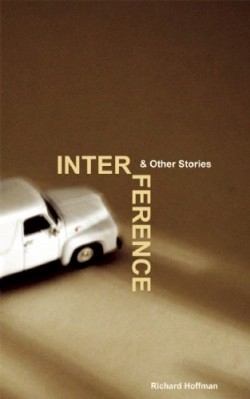Interference and Other Stories
- 2009 INDIES Finalist
- Finalist, Short Stories (Adult Fiction)
With the publication of Interference, Richard Hoffman has put perspicacity to page. His theories of gender are uttered in the lives of fully drawn characters. Like a familiar walk on different days, these stories tread over the same ground, but each is a unique event. Concentrated on themes of what it means to be male, this is affecting work. Hoffman’s memoir Half the House was awarded the Boston Athenaeum Readers’ Prize in 1996, his recent poetry collection Gold Star Road (2007) won the Barrow Street Press Poetry Prize, and the reader can expect similar recognition for this collection as well.
Interference is the interaction of waves that are too similar or which come from the same source; as such, it isa fitting shorthand for what occurs in this book. The male characters suffer from the same untamed rage and similar vulnerabilities and patterns of development. Their movements are as correlated as parallel waves. Each pair of characters—man and boy, recovered alcoholic and AA sponsee—encounters these intergenerational patterns. Sons must negotiate the extent they’ll become their fathers while older men recognize their reincarnation. In “Gentlemen,” for instance, Walter sees his past echoed in his son-in-law’s broken windshield. Walter lets his thumb graze past the young man’s Adam’s apple and says, as a warning, “You need to know that I remember what it’s like to have your rage twist up your way of seeing things.”
Interference formally evokes Hemingway’s In Our Time in its series of interchapters, which punctuate the book. Like Hemingway’s, Hoffman’s vignettes are intimately related to the stories they precede and follow. Hoffman’s vignettes begin with jokey titles like “guy goes into a bar” and “guy goes into a therapist’s office.” The “jokes,” which are far from airy, offer a dip into the implausible; they are surreal renditions of the stories’ central ideas. Humor gets at a different heart of things and adds a punch, as these bracing short segments do.
Interference makes sound—a muffled roar, faint voices, harsh and soft—these are the sounds of masculinity as portrayed in this book. In the end, interference is a sonic emblem of trauma that the character will carry in his head forever after, as we carry this book.
Disclosure: This article is not an endorsement, but a review. The publisher of this book provided free copies of the book to have their book reviewed by a professional reviewer. No fee was paid by the publisher for this review. Foreword Reviews only recommends books that we love. Foreword Magazine, Inc. is disclosing this in accordance with the Federal Trade Commission’s 16 CFR, Part 255.

